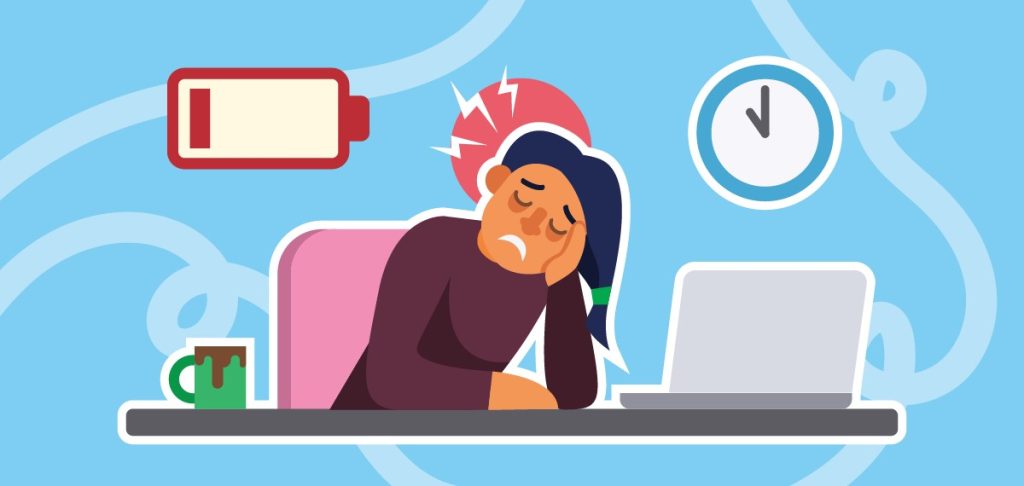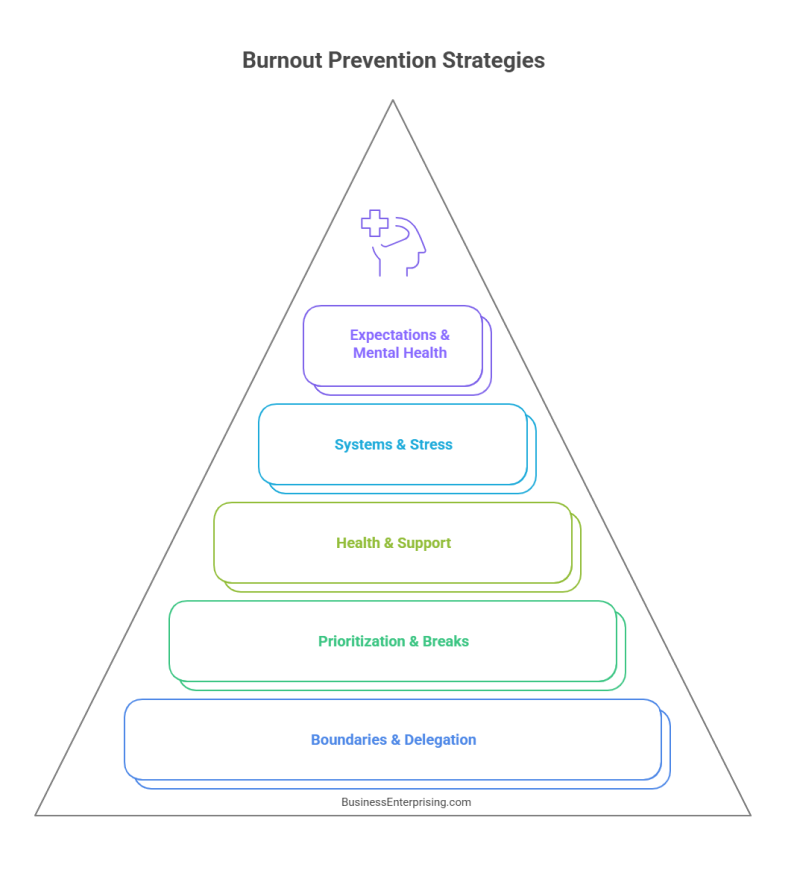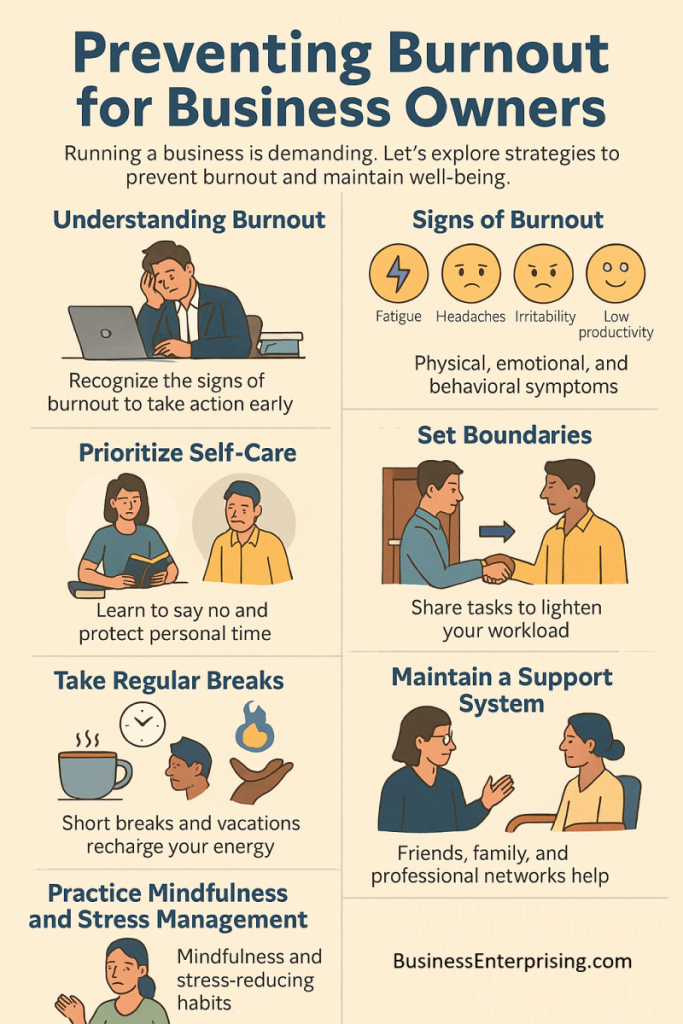Running a business is demanding, requiring relentless dedication, long hours, and the ability to juggle multiple responsibilities. While the rewards can be significant, the risk of burnout is a real concern for many business owners. Burnout can lead to physical and mental exhaustion, reduced productivity, and diminished enthusiasm for the business. Let’s explore strategies for preventing burnout and actionable steps for business owners to maintain their well-being.
Understanding Burnout
Understanding burnout is essential for business owners. Many of you work long hours and face constant pressure to meet demands. This can leave you feeling exhausted and mentally drained. However, burnout isn’t just about feeling tired. It can affect your health, your decision-making, and your ability to stay motivated.
Additionally, burnout can sneak up on you if you’re not paying attention. You might notice small signs like trouble sleeping or feeling less engaged. Therefore, it’s important to look at how you’re managing your workload. If you’re working nonstop without breaks, burnout is more likely to follow.
However, there are ways to protect yourself. Preventing burnout means giving yourself time to step back and recharge. This could be as simple as taking short breaks during the day or setting aside one day each week to disconnect from work. Additionally, talking with trusted advisors or peers can help you see the bigger picture.
Therefore, you should watch for signs that you’re stretched too thin. You might feel short-tempered or struggle to focus on what matters most. When you notice these things, take action. Cut back on low-value tasks and give yourself space to rest.
Furthermore, remind yourself why you started your business. This can help you stay motivated even when things get tough. Building a business is hard work, but you don’t have to burn out in the process. With a little care, you can keep moving forward without losing your passion for what you do.
Burnout is a state of chronic physical and emotional exhaustion caused by prolonged stress. It can manifest in various ways, including:
Physical Symptoms
Persistent fatigue, headaches, muscle tension, and sleep disturbances.
Emotional Symptoms
Feelings of helplessness, irritability, anxiety, and depression.
Behavioral Symptoms
Decreased productivity, withdrawal from social interactions, and neglect of personal responsibilities.
Recognizing these signs early is crucial for addressing burnout before it becomes a more severe issue.
Ways of Preventing Burnout
Preventing burnout starts with listening to your body and mind. You need to give yourself time to rest and recharge. Additionally, setting clear boundaries between your work and personal life can help protect your energy. For example, you might decide to stop checking emails after a certain hour.
However, you should also find ways to break up your routine. Small changes like taking a quick walk or calling a friend can refresh your mind. Therefore, it’s important to recognize that rest is just as productive as work. It allows you to come back with more focus and energy.
Furthermore, you can prevent burnout by sharing your challenges. Talking to someone you trust can give you a new perspective. It might also remind you that you’re not alone. Additionally, seeking advice or mentorship can help you find better ways to handle stress.
However, you should remember that your well-being comes first. When you feel yourself slipping into negative patterns, it’s okay to pause and regroup. This might mean scaling back on commitments or asking for support. Therefore, giving yourself permission to rest is not a weakness.
By focusing on small, sustainable habits, you can keep your work from consuming all your energy. Preventing burnout is about finding balance, not pushing harder. As you experiment with different strategies, you’ll see what works best for you. Take time to care for yourself so you can continue to build and grow your business without losing your spark.
Prioritize Self-Care
Prioritizing self-care is one of the smartest ways to protect your health and stay productive. Many business owners overlook this simple idea when they’re busy. However, taking care of yourself helps you show up as your best self every day.
Additionally, self-care doesn’t have to be complicated. It can be as simple as getting enough sleep or eating regular meals. You might also take time to enjoy a hobby or read a book that has nothing to do with work. Therefore, it’s wise to schedule these breaks and treat them as essential parts of your day.
However, self-care is more than just physical rest. It also includes your mental well-being. That’s why it’s helpful to pay attention to your thoughts and emotions. If you’re feeling overwhelmed, it’s okay to take a step back and re-evaluate your workload.
Furthermore, preventing burnout is easier when you prioritize self-care consistently. Even small habits, like a quick walk or a few minutes of quiet reflection, can add up over time. Additionally, you’ll find that taking care of yourself makes you more creative and focused when you’re working.
Therefore, you don’t have to feel guilty for putting yourself first. Self-care is a practical investment in your energy and resilience. When you respect your needs, you’re more likely to avoid burnout and stay connected to what really matters to you.
By making self-care a daily practice, you can keep moving forward with purpose and clarity. You’ll find that your work becomes more meaningful and enjoyable when you’re feeling rested and centered. Remember, you can’t pour from an empty cup, so start with yourself first.
Exercise Regularly
Physical activity is a powerful stress reliever . Aim for at least 30 minutes of exercise most days of the week. This could be anything from a brisk walk to a yoga session or a workout at the gym.
Eat Healthily
Maintain a balanced diet rich in fruits, vegetables, lean proteins, and whole grains. Avoid excessive caffeine, sugar, and processed foods, which can contribute to energy crashes and mood swings.
Get Enough Sleep
Aim for 7-9 hours of sleep per night. Quality sleep is essential for physical health, cognitive function, and emotional well-being.
Set Boundaries
Setting boundaries is an important part of managing your workload and protecting your well-being. It’s about knowing your limits and sticking to them. However, many business owners feel guilty for saying no or stepping back. You don’t have to feel that way. Setting boundaries isn’t selfish—it’s a sign that you respect your time and energy.
Additionally, clear boundaries help you avoid burnout and stay focused on your goals. For example, you might decide to stop checking emails after a certain hour. This simple step can protect your time and allow you to recharge. Therefore, setting boundaries isn’t about cutting yourself off from others. It’s about giving yourself permission to take care of what matters most to you.
Furthermore, boundaries make it easier to handle stress and stay productive. When you respect your own limits, you’re less likely to feel overwhelmed or resentful. Additionally, your clients and team members will learn to respect those limits, too.
However, setting boundaries can be challenging at first. You might worry about missing out on opportunities or disappointing others. Therefore, it’s important to be clear and consistent. Communicate your limits in a straightforward way and stick to them.
By setting boundaries, you create space for rest, creativity, and growth. It’s one of the best tools for preventing burnout and staying engaged with your work. Additionally, you’ll find that you’re more present and effective when you’re not stretched too thin. You don’t have to do everything at once. Small changes in how you manage your time can make a big difference in your daily life.
Define Work Hours
Establish clear work hours and stick to them. Avoid the temptation to work late into the night or on weekends. Setting boundaries helps maintain a healthy work-life balance.
Learn to Say No
Understand that you cannot do everything. Prioritize tasks and learn to delegate or decline responsibilities that are not essential. This helps prevent overloading yourself.
Delegate Responsibilities
Delegating responsibilities is an important part of managing your workload as a business owner. You don’t have to do everything alone. However, many people find it hard to let go of control. You might feel like you’re the only one who can get things done right.
Additionally, delegating tasks can help you focus on the work that truly matters to you. This is a smart move if you’re serious about preventing burnout. Therefore, it’s helpful to identify tasks that someone else can handle. Start small and build trust with your team.
Furthermore, delegating builds confidence in your employees. It shows them that you value their contributions and want them to grow. Additionally, you’ll find that it frees up time for you to focus on new opportunities. However, it’s important to communicate clearly when you delegate. Make sure everyone understands their roles and has the support they need.
Therefore, you should set realistic expectations and give honest feedback. This keeps everyone on the same page and builds trust. Additionally, delegating gives you space to step back and see the big picture. You’ll be more strategic and less reactive when you’re not caught up in every little detail.
By sharing your workload, you’re not just helping your team. You’re also giving yourself room to breathe and think more clearly. Preventing burnout isn’t about doing less—it’s about working smarter and making the most of your time. You’ll find that you’re more focused and effective when you let others step up and contribute.
Trust Your Team
Delegate tasks to capable team members. Trusting your team with responsibilities not only lightens your workload but also empowers employees and promotes their professional growth.
Outsource When Necessary
Consider outsourcing non-core activities, such as accounting, marketing, or IT support, to specialized professionals. This allows you to focus on strategic business tasks.
Take Regular Breaks
Taking regular breaks is one of the simplest ways to stay focused and healthy. Many people think constant work means more progress. However, pushing yourself too hard often leads to frustration and exhaustion. Short breaks can keep your mind fresh and your energy steady.
Additionally, regular breaks give you a chance to see problems from a different angle. Stepping away from your desk, even for a few minutes, can help you refocus. Therefore, you’re more likely to find creative solutions when you return to your tasks.
Furthermore, these breaks help your body as much as your mind. Sitting for long periods can strain your back and shoulders. However, standing up or stretching can ease that discomfort. Additionally, a quick break can help you check in with your emotions and manage stress before it builds up.
Therefore, try to plan breaks throughout your day. You might walk around the block or simply breathe deeply for a few minutes. It doesn’t have to be complicated. Regular pauses can make your workday feel less heavy and more manageable.
Preventing burnout often starts with respecting your body’s limits. Breaks remind you that you don’t have to be in constant motion to make progress. Additionally, sharing your break habits with coworkers can build a healthier work culture. They might be inspired to do the same.
By making breaks a daily habit, you’re giving yourself permission to rest. You’re also showing that your health matters just as much as your to-do list. Over time, you’ll see how these small moments of pause can add up to better focus and more creative thinking. You’re more than your work, and you deserve a break.
Short Breaks During Work
Take short breaks throughout the day to rest and recharge. Step away from your desk, stretch, or take a quick walk. These breaks can enhance focus and productivity.
Vacations and Days Off
Schedule regular vacations and days off to disconnect from work entirely. Taking time off is crucial for recharging your mental and physical energy.
Prioritizing Self-Care for Preventing Burnout
Prioritizing self-care is an essential part of preventing burnout. Many business owners feel they need to be available all the time. However, constantly being on call can wear you down. You might think you’re staying productive, but it often leads to stress and fatigue.
Additionally, small breaks throughout your day can make a big difference. Even a ten-minute walk or a quick chat with a friend can reset your mind. Therefore, it’s important to see these moments as valuable, not as wasted time.
Furthermore, self-care isn’t just about relaxation. It’s also about setting healthy boundaries and listening to your body. You might notice you’re more focused and patient when you take time to rest. Additionally, taking breaks helps you spot problems and solve them more clearly.
However, it’s easy to push self-care aside when you’re busy. That’s why you need to schedule time for it, just like you do for work tasks. Therefore, you could plan one day a week with no calls or emails. This can help you recharge and keep your mind fresh.
Additionally, sharing your experiences with a trusted friend or mentor can be helpful. It can remind you that taking care of yourself is part of doing good work. You can’t give your best to your business if you’re exhausted and drained.
By putting self-care first, you’re not just helping yourself. You’re also setting a better example for your team and your clients. Preventing burnout means respecting your own limits and making your well-being a top priority.
Practice Mindfulness and Stress Management
Practicing mindfulness and stress management is a smart way to stay balanced and focused. Many business owners find themselves caught up in daily demands. However, taking a few minutes to pause and breathe can bring you back to the present. Mindfulness can help you see what’s really happening instead of getting lost in stress.
Additionally, small daily habits can make a big difference. For example, you might spend five minutes each morning just noticing your breath. This can help you start your day feeling calm and centered. Therefore, practicing mindfulness isn’t just about relaxation—it’s a way to clear your head and refocus.
Furthermore, mindfulness can help you identify stress before it takes over. You can notice when your shoulders are tight or your thoughts are racing. Additionally, it reminds you that you can control how you react to stress. This simple awareness can help you make better decisions.
However, mindfulness is just one piece of stress management. Regular exercise and healthy eating also help. Therefore, try to make these habits part of your daily routine. You don’t need to be perfect. Small changes can add up over time.
Preventing burnout is easier when you make mindfulness part of your day. It’s not about ignoring stress. It’s about noticing it and deciding what to do next. Additionally, sharing your mindfulness practices with others can build a supportive environment. You’ll find that your team might appreciate these practices too.
By taking time for mindfulness, you’re giving yourself space to breathe and reset. You’ll find you’re more focused and patient in your work and personal life. It’s a simple tool that can help you handle whatever comes your way.
Mindfulness Practices
Engage in mindfulness practices such as meditation, deep breathing exercises, or yoga. These activities can reduce stress and improve emotional regulation.
Stress Management Techniques
Identify stress management techniques that work for you, such as journaling, listening to music, or spending time in nature. Incorporate these practices into your routine.
Maintain a Support System
Maintaining a support system is one of the smartest moves you can make as a business owner. It’s easy to feel like you have to handle everything alone. However, having trusted friends or advisors to talk to can make your work feel less heavy. You don’t have to carry it all by yourself.
Additionally, a support system gives you a place to share your wins and challenges. This can help you see things from new perspectives. Therefore, it’s worth taking time to build these connections. They can help you think more clearly when you’re stuck.
Furthermore, talking to people you trust can be a relief when work feels overwhelming. It can remind you that you’re not alone. Additionally, they can help you remember why you started your business in the first place.
However, building a support system takes some effort. You might need to reach out to old friends or join a business group. Therefore, it’s important to stay open to new conversations and connections. These relationships can be a powerful source of strength.
Preventing burnout often starts with knowing you have people to lean on. It’s not just about getting advice—it’s about feeling understood. When you’re around people who listen and care, you’re more likely to stay motivated.
By making time for these relationships, you’re giving yourself a better shot at staying balanced and healthy. You’re also showing that it’s okay to ask for help. This can be a lesson that sticks with you and helps you support others too. You’re more likely to stay focused and energized when you’re part of a team, even if that team is just a few trusted people.
Professional Networks
Connect with other business owners or join professional networks. Sharing experiences and challenges with peers can provide valuable support and insights.
Personal Relationships
Nurture your relationships with family and friends. A strong support system can offer emotional support and help you maintain perspective.
Focus on What You Love
Focusing on what you enjoy can make your work feel more meaningful and manageable. Many people forget that passion plays a big role in how you feel about work. However, if you spend all your time on tasks that drain you, burnout can sneak up quickly.
Additionally, doing what you enjoy helps you feel more motivated and engaged. When you’re excited about your work, you’re less likely to feel stuck. Therefore, it’s wise to carve out time for projects that genuinely spark your interest.
Furthermore, you’ll notice you work faster and with more creativity when you’re doing something you like. That’s why it’s helpful to remind yourself of what drew you to your business in the first place. Additionally, sharing these interests with your team can inspire them, too.
However, you might need to say no to tasks that don’t align with your goals. It’s okay to delegate or let them go. Therefore, you can spend more time on the parts of your work that bring you satisfaction.
Additionally, enjoying your work doesn’t mean every task will be easy. There will still be challenges and setbacks. However, when you’re connected to what excites you, those obstacles feel smaller. They become chances to learn instead of just problems to solve.
Preventing burnout is about making space for what matters to you. By focusing on what you enjoy, you’re showing that your energy and time have value. You’re more likely to stick with your business long-term when you’re working on projects that feel rewarding. Over time, you’ll see how much your enjoyment shapes your success.
Rediscover Your Passion
Remind yourself why you started your business in the first place. Reconnect with the aspects of your work that you love and find fulfilling. This can reignite your passion and motivation.
Incorporate Enjoyable Activities
Make time for hobbies and activities that bring you joy and relaxation. Whether it’s reading, gardening, or playing a musical instrument, engaging in activities you enjoy can provide a healthy escape from work stress.
Seek Professional Help if Needed
Seeking professional help when you need it is one of the smartest choices you can make. Many business owners feel like they should handle everything alone. However, talking to a professional can help you see things more clearly and find new solutions.
Additionally, working with a therapist or coach doesn’t mean you’ve failed. It shows that you’re committed to your well-being. Therefore, you might find that talking through your stress can give you a fresh perspective.
Furthermore, professionals can help you spot patterns in your thinking that might be causing problems. They can suggest practical strategies to deal with stress and prevent burnout. Additionally, having a safe space to talk about your worries can be a relief.
However, some people feel embarrassed about asking for help. You don’t have to feel that way. Everyone needs help at some point. Therefore, consider reaching out when you feel overwhelmed or stuck.
Additionally, it’s important to remember that taking care of your mental health is just as important as any other part of your work. When you feel strong and supported, you’re more likely to make better decisions. You’re also more likely to enjoy your work again.
Preventing burnout starts with knowing your limits and taking care of yourself. If you’re feeling lost or worn down, professional help can make a big difference. You’re not alone, and there’s no shame in getting the support you need. By doing so, you’re giving yourself the best chance to stay healthy, happy, and productive.
Therapy and Counseling
If you find yourself struggling with burnout despite implementing self-care strategies, consider seeking help from a mental health professional. Therapy or counseling can provide valuable support and coping strategies.
Coaching and Mentoring
Working with a business coach or mentor can help you navigate challenges and develop effective strategies for managing stress and workload.
Preventing burnout is essential for maintaining the health, well-being, and productivity of business owners. By prioritizing self-care, setting boundaries, delegating responsibilities, taking regular breaks, practicing mindfulness, maintaining a support system, focusing on passions, and seeking professional help when needed, business owners can manage stress effectively and sustain their energy and enthusiasm for their work.
In today’s demanding business environment, it’s crucial to recognize the signs of burnout early and take proactive steps to address them. By implementing these strategies, business owners can achieve a healthier work-life balance, enhance their overall well-being, and continue to lead their businesses to success. Remember, taking care of yourself is not just a personal priority but a strategic business decision that benefits you, your team, and your company as a whole.




